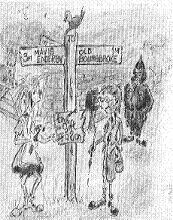A few month’s ago, when I was bitten by the sonnet-writing bug – well, it was more of a vaccination as it turns out – I was amazed to find just how much sonnet-writing is going on out there.
Stephen Fry who wrote the ‘manual of prosody’, The Ode Less Travelled, need not worry about the survival of formal poetry. Free verse may be the stuff of modern published poetry, but strict metre and rhyme have not lost their attraction.
And it’s the sonnet that rules. There’s something about this little 14-line piece of verse that seduces and obsesses.
It’s length gives the poet room to breathe, but not so much that he can avoid concision. The volta around line 8 adds a little drama and the final couplet (in the Shakespearean version), when done well, provides a rather satisfying denouement.
And Shakespeare wrote some of the world’s best-loved poetry in the world, using the sonnet form. That alone makes it the ambition of every versifier.
In my enthusiasm I set up a Google alert using the word sonnet and not a day goes by without my being directed to half a dozen websites and blogs.
Some of these hits are unexpected. For example, I’ve discovered that actor Forest Whittaker has a daughter called Sonnet; that there’s some piece of hardware/software which goes by the name of Sonnet; and that there is an extremely well-endowed Polish topless model called Ewa Sonnet. (You can find your own link to her, but she’s definitely worth a pentameter or two).
Here are a few that I happened on today.
Digilitera, which describes itself as being concerned with 'algorithm-based literature and interesting technology', all rather beyond me.
Independent Scholar, who is a published poet and blogs about the daily routine of writing and worries about whether he can truly call himself a writer.
Sonnet Boy I've mentioned before and here he reflects on the project he set himself to write a sonnet every day for a year. His self-discipline amazes me. In this link he talks about the trials and joys of the last year's daily toil.
Far more courageous is this blog, Talk to the Hump, described as 'the ravings of a gay man living with AIDS and lypodystrophy.' In the sonnet written here, he ponders the time he may have contracted HIV. Like all good poetry it is better read than discussed.

No comments:
Post a Comment